unit11----12学案
七年级英语上册 Unit 11 What time do you go to school同步学案 新目标
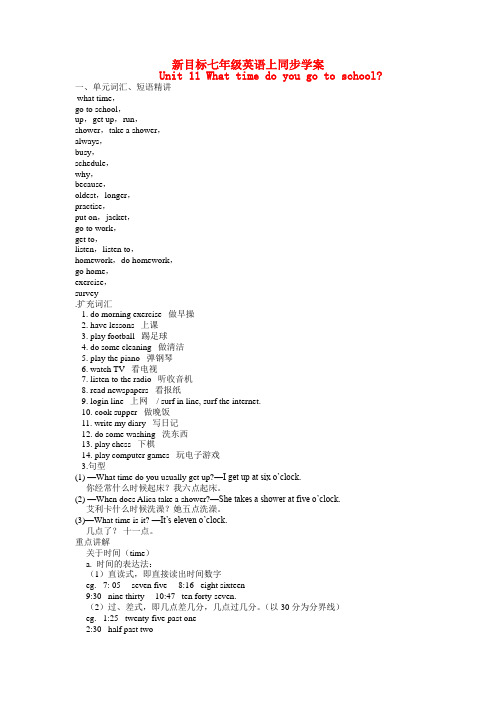
新目标七年级英语上同步学案Unit 11 What time do you go to school?一、单元词汇、短语精讲what time,go to school,up,get up,run,shower,take a shower,always,busy,schedule,why,because,oldest,longer,practise,put on,jacket,go to work,get to,listen,listen to,homework,do homework,go home,exercise,survey.扩充词汇1. do morning exercise 做早操2. have lessons 上课3. play football 踢足球4. do some cleaning 做清洁5. play the piano 弹钢琴6. watch TV 看电视7. listen to the radio 听收音机8. read newspapers 看报纸9. login line 上网/ surf in line, surf the internet.10. cook supper 做晚饭11. write my diary 写日记12. do some washing 洗东西13. play chess 下棋14. play computer games 玩电子游戏3.句型(1) —What time do you usually get up?—I get up at six o’clock.你经常什么时候起床?我六点起床。
(2) —When does Alica take a shower?—She takes a shower at five o’clock.艾利卡什么时候洗澡?她五点洗澡。
(3)—What time is it? —It’s eleven o’clock.几点了?十一点。
人教版英语七年级下册【推荐】Unit11Howwasyourschooltrip(学案2)
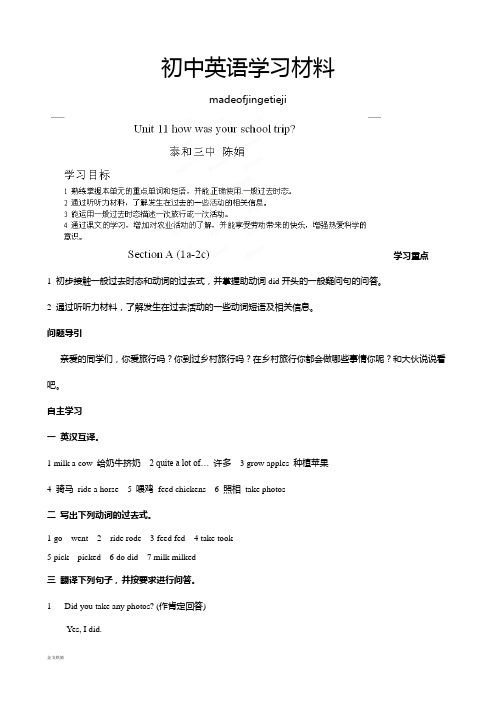
初中英语学习材料madeofjingetieji学习重点1 初步接触一般过去时态和动词的过去式,并掌握助动词did开头的一般疑问句的问答。
2 通过听听力材料,了解发生在过去活动的一些动词短语及相关信息。
问题导引亲爱的同学们,你爱旅行吗?你到过乡村旅行吗?在乡村旅行你都会做哪些事情你呢?和大伙说说看吧。
自主学习一英汉互译。
1 milk a cow 给奶牛挤奶2 quite a lot of… 许多3 grow apples 种植苹果4 骑马ride a horse5 喂鸡feed chickens6 照相take photos二写出下列动词的过去式。
1 go went2 ride rode3 feed fed4 take took5 pick picked6 do did7 milk milked三翻译下列句子,并按要求进行问答。
1 --- Did you take any photos? (作肯定回答)--- Yes, I did.2 ----Did they grow apples? (作否定回答)---- No, they didn’t.3 ---- Did he eat strawberries? (作否定回答)----No, he didn’t.四完成课本1a部分。
合作探究任务一和小组成员一起讨论一下问题。
1 Does your school have any school trips?2 What do you usually do on your school trip?图片1 参观博物馆visit museums图片2 爬山go to the mountains图片3 去农场go to the farm图片4 去动物园go to the zoo3 How was your last school trip?任务二1 听课本1b的录音,圈出Carol所做的三件事情,并按要求完成1c当中的对话练习。
人教版七年级下册Unit11 教材重难点学案设计(含一般过去时讲练) 无答案
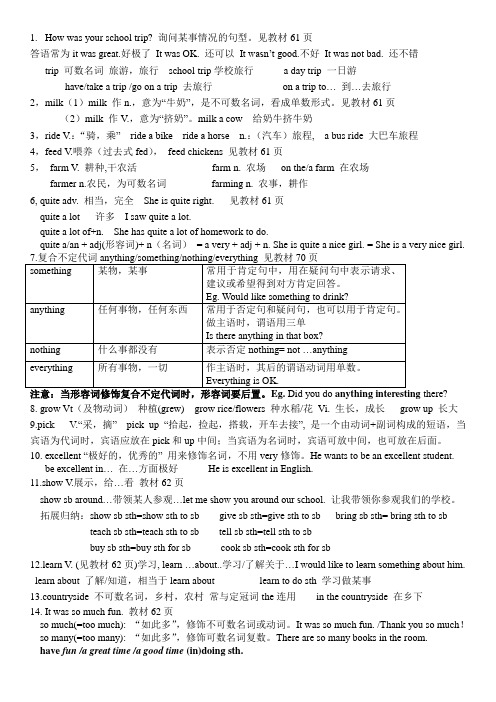
1.How was your school trip? 询问某事情况的句型。
见教材61页答语常为it was great.好极了It was OK. 还可以It wasn’t good.不好It was not bad. 还不错trip 可数名词旅游,旅行school trip学校旅行 a day trip 一日游have/take a trip /go on a trip 去旅行on a trip to… 到…去旅行2,milk(1)milk 作n.,意为“牛奶”,是不可数名词,看成单数形式。
见教材61页(2)milk 作V.,意为“挤奶”。
milk a cow 给奶牛挤牛奶3,ride V.:“骑,乘” ride a bike ride a horse n.:(汽车)旅程, a bus ride 大巴车旅程4,feed V.喂养(过去式fed),feed chickens 见教材61页5,farm V. 耕种,干农活farm n. 农场on the/a farm 在农场farmer n.农民,为可数名词farming n. 农事,耕作6, quite adv. 相当,完全She is quite right.见教材61页quite a lot 许多I saw quite a lot.quite a lot of+n. She has quite a lot of homework to do.quite a/an + adj(形容词)+ n(名词)= a very + adj + n. She is quite a nice girl. = She is a very nice girl.there?8. grow Vt(及物动词)种植(grew) grow rice/flowers 种水稻/花Vi. 生长,成长grow up 长大9.pick V.“采,摘” pi ck up “拾起,捡起,搭载,开车去接”, 是一个由动词+副词构成的短语,当宾语为代词时,宾语应放在pick和up中间;当宾语为名词时,宾语可放中间,也可放在后面。
unit 11 英语
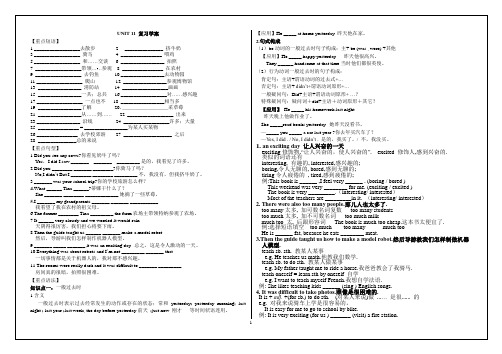
2.句式构成
(1)be动词的一般过去时句子构成:主+ be (was , were) +其他
【应用】He _____ happy yesterday .昨天他很高兴。
They ______ handsome at that time.当时他们都很英俊。
e.g.对我来说骑车上学是很容易的。
It is easy for me to go to school by bike.
例: It is very exciting (for us ) _______ (visit) a fire station.
5.I didn’t like the trip at all.
我一点也不喜欢这次旅游。
not… at all “一点也不;根本不”
e.g.我根本不喜欢吃苹果。
I don’t like apples at all.
例:这幅画一点也不贵.(汉译英)
_______________________________
【巩固练习】
一、根据所给提示完成句中单词。
1. --Alice, here are some g________for your birthday. --Thank you.
teach sb. sth.教某人某事
e.g. He teaches us math.他教我们数学.
teach sb. to do sth.教某人做某事
e.g. My father taught me to ride a horse.我爸爸教会了我骑马.
teach oneself= learn sth by oneself自学
Unit 11 How was your school trip人教版新目标七年级下册英语优秀教学设计 初一教案有教学反思
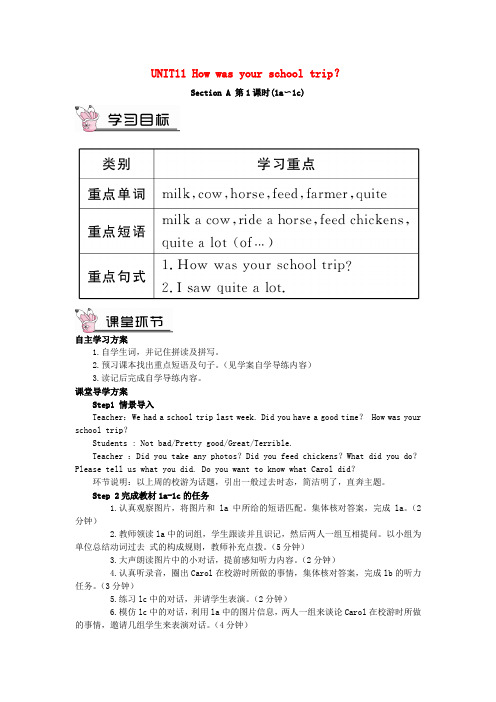
UNIT11 How was your school trip?Section A 第1课时(1a〜1c)自主学习方案1.自学生词,并记住拼读及拼写。
2.预习课本找出重点短语及句子。
(见学案自学导练内容)3.读记后完成自学导练内容。
课堂导学方案Step1 情景导入Teacher:We had a school trip last week. Did you have a good time? How was your school trip?Students : Not bad/Pretty good/Great/Terrible.Teacher :Did you take any photos?Did you feed chickens?What did you do?Please tell us what you did. Do you want to know what Carol did?环节说明:以上周的校游为话题,引出一般过去时态,简洁明了,直奔主题。
Step 2完成教材1a-1c的任务1.认真观察图片,将图片和la中所给的短语匹配。
集体核对答案,完成la。
(2分钟)2.教师领读la中的词组,学生跟读并且识记,然后两人一组互相提问。
以小组为单位总结动词过去式的构成规则,教师补充点拨。
(5分钟)3.大声朗读图片中的小对话,提前感知听力内容。
(2分钟)4.认真听录音,圈出Carol在校游时所做的事情,集体核对答案,完成lb的听力任务。
(3分钟)5.练习lc中的对话,并请学生表演。
(2分钟)6.模仿lc中的对话,利用la中的图片信息,两人一组来谈论Carol在校游时所做的事情,邀请几组学生来表演对话。
(4分钟)参考案例:A:Did Carol take any photos?B:Yes,she did. /No,she didn’t.7.小结训练。
(4分钟)(1)— What did Sam do on the farm?—He B chickens.A feedsB fedC grows(2)— C you to the zoo last Sunday?—No,I didn'.A. Do;goB. Are;going C . Did;go环节说明:听说结合,第一时间向学生传达语言目标,结对对话练习和小结训练,使语言目标得以强化。
八年级英语上:Unit 11 Could you please clean your room学案 人教新目标版
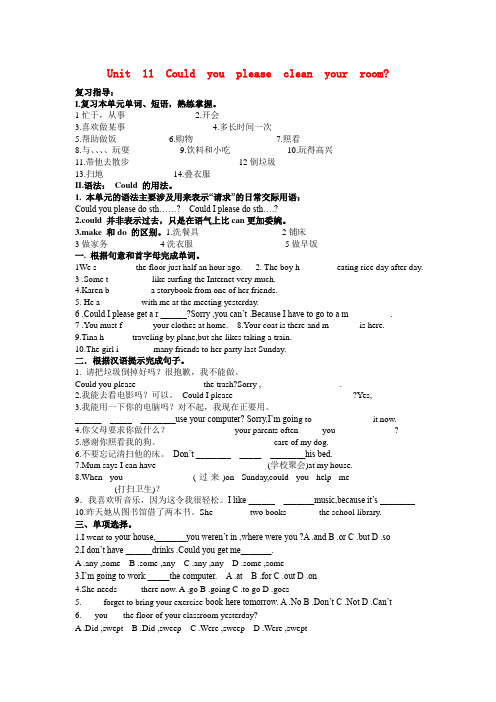
Unit 11 Could you please clean your room?复习指导:I.复习本单元单词、短语,熟练掌握。
1忙于,从事________________2.开会______________________3.喜欢做某事____________________4.多长时间一次______________________5.帮助做饭____________6.购物___________________7.照看________________8.与、、、、玩耍___________ 9.饮料和小吃_____________10.玩得高兴____________11.带他去散步_________________________12倒垃圾_______________________13.扫地________________14.叠衣服__________________II.语法:Could 的用法。
1. 本单元的语法主要涉及用来表示“请求”的日常交际用语:Could you please do sth……? Could I please do sth….?2.could 并非表示过去,只是在语气上比can更加委婉。
3.make 和do 的区别。
1.洗餐具___________________2铺床____________________3做家务____________4洗衣服_____________________5做早饭________________一. 根据句意和首字母完成单词。
1We s_________the floor just half an hour ago. 2. The boy h ________eating rice day after day.3 .Some t__________like surfing the Internet very much.4.Karen b _________a storybook from one of her friends.5. He a _________with me at the meeting yesterday.6 .Could I please get a r ______?Sorry ,you can’t .Because I have to go to a m _________.7 .You must f ______ your clothes at home. 8.Your coat is there and m_______is here.9.Tina h______ traveling by plane,but she likes taking a train.10.The girl i________many friends to her party last Sunday.二.根据汉语提示完成句子。
九年级U12复习学案答案版
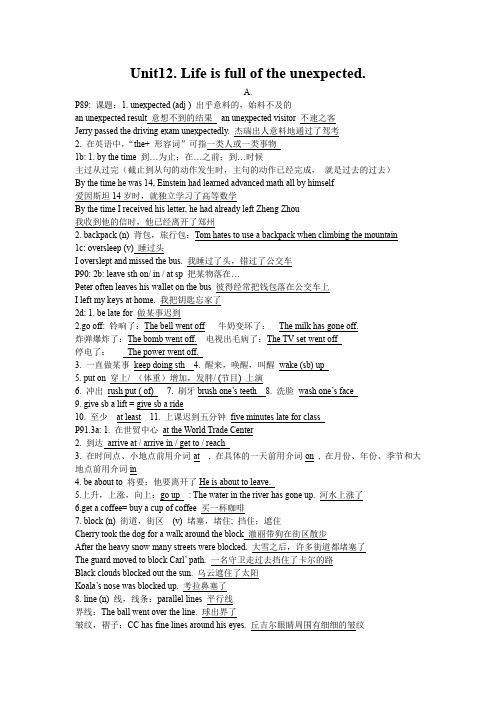
Unit12. Life is full of the unexpected.A.P89: 课题:1. unexpected (adj ) 出乎意料的,始料不及的an unexpected result 意想不到的结果an unexpected visitor 不速之客Jerry passed the driving exam unexpectedly. 杰瑞出人意料地通过了驾考2. 在英语中,“the+ 形容词”可指一类人或一类事物1b: 1. by the time 到…为止;在…之前;到…时候主过从过完(截止到从句的动作发生时,主句的动作已经完成,就是过去的过去)By the time he was 14, Einstein had learned advanced math all by himself爱因斯坦14岁时,就独立学习了高等数学By the time I received his letter, he had already left Zheng Zhou我收到他的信时,他已经离开了郑州2. backpack (n) 背包,旅行包:Tom hates to use a backpack when climbing the mountain1c: oversleep (v) 睡过头I overslept and missed the bus. 我睡过了头,错过了公交车P90: 2b: leave sth on/ in / at sp 把某物落在…Peter often leaves his wallet on the bus 彼得经常把钱包落在公交车上I left my keys at home. 我把钥匙忘家了2d: 1. be late for 做某事迟到2.go off: 铃响了:The bell went off 牛奶变坏了:The milk has gone off.炸弹爆炸了:The bomb went off. 电视出毛病了:The TV set went off停电了:The power went off.3. 一直做某事keep doing sth4. 醒来,唤醒,叫醒wake (sb) up5. put on 穿上/ (体重)增加,发胖/ (节目) 上演6. 冲出rush put ( of)7. 刷牙brush one’s teeth8. 洗脸wash one’s face9. give sb a lift = give sb a ride10. 至少at least 11. 上课迟到五分钟five minutes late for classP91.3a: 1. 在世贸中心at the World Trade Center2. 到达arrive at / arrive in / get to / reach3. 在时间点、小地点前用介词at , 在具体的一天前用介词on , 在月份、年份、季节和大地点前用介词in4. be about to 将要:他要离开了He is about to leave.5.上升,上涨,向上:go up : The water in the river has gone up. 河水上涨了6.get a coffee= buy a cup of coffee 买一杯咖啡7. block (n) 街道,街区(v) 堵塞,堵住; 挡住;遮住Cherry took the dog for a walk around the block 澈丽带狗在街区散步After the heavy snow many streets were blocked. 大雪之后,许多街道都堵塞了The guard moved to block Carl’ path. 一名守卫走过去挡住了卡尔的路Black clouds blocked out the sun. 乌云遮住了太阳Koala’s nose was blocked up. 考拉鼻塞了8. line (n) 线,线条:parallel lines 平行线界线:The ball went over the line. 球出界了皱纹,褶子:CC has fine lines around his eyes. 丘吉尔眼睛周围有细细的皱纹排,行,列:Kids are standing in a line 孩子们站成一排家族,家系:Carl comes from a long line of doctors 卡尔来自一个医生世家NPL is second in line to the president. 拿破仑的地位仅次于总统字行,便条,歌词,对白:I can only remember the first two lines of that song我只记得那首歌的前两句歌词to learn your lines 背台词fishing line 钓鱼线电话线:The line is busy, please try again later 线路正忙,请稍后再拨排队等候wait in line9. worker (n) 工人:Bill is a skilled worker. 鼻耳是个熟练工10. go on 发生/ 继续11. stare (v) 凝视,盯着,注视; (n) 凝视,注视Jane screamed and everyone stared at her. 简一声尖叫,大家都盯着她看She gave us a blank stare. 她面无表情地直视着我们12. disbelief (n) 不信,怀疑:He stared at me in disbelief 她怀疑地盯着我disbelieve(v) 不信,怀疑:Why should I disbelieve her story? 我为什么要怀疑她所说的呢?13. above (prep/ adv/ adj) 在…上面; 上面;上述的,上面的We were flying over the clouds 我们飞在云层上方We can’t accept children above 10 years old. 我们不接受十岁以上的儿童Put it on the shelf above. 把它放在上面的搁板上Please write to us at the above address. 请按上述地址来函14. burn (v) 燃烧,着火,烧毁,烧伤Fires were burning all over the city. 全城一片火海Two children were saved from the burning car. 两名儿童从燃烧着的车中被救了出来The cigarette burnt a hole in the carpet. 香烟把地毯烧了个洞The soup’s hot, don’t burn your mouth. 汤很热,别烫了嘴My skin burns easily. 我的皮肤容易晒伤burn your bridges/ boats 破釜沉舟/ 背水一战/ 不留后路burn a hole in your pocket 花钱没有节制burn the midnight oil 挑灯夜战,熬夜burn one’s fingers / get one’s fingers burnt 因不慎而吃亏15.alive: (adj) 活着的,在世的:一般做表语,也可作后置定语或宾补:We don’t know whether he’s alive or dead. 我不知道他是死是活Is that old dog still alive? 那条老狗还活着吗?He was buried alive in the earthquake. 他在地震中被活埋了living: 活着的,可做表语或定语,作表语可与alive互换,作定语要前置。
新目标英语七年级上册学案及典型例题Unit12Myfavoritesubjectisscience

新目标英语七年级上册学案及典型例题Unit 12 My favoritesubject is science教学目标1. 谈论学校学习科目2. 谈论最喜欢的科目及其原因3. 互相询问最喜欢的事情及其原因教学内容1.词汇subject , science , physical , education , physical education , P.E. teacher , Mr , Mrs , example , partner , city , mom , dad , Tuesday , Thursday , Wednesday , Friday , Monday , biology , finish , gymnastics , strict , miss , any , year (s) old , classmate , assessment , note , suregeography 地理,history历史,politics 政治schedule 安排,kind,善良,funny 有趣的,psychology心理学,Spring Festival 春节,festival 节日Christmas圣诞节,Thanksgiving Day 感恩节Christianity Easter / Easter 复活节 Fool’s Day 愚人节Children’s Day / Teacher’s Day / National Day2.句型1. -What’s your favorite subject ?-My favorite subject is Chinese .2. -What’s her favorite subject ?-Her favorite subject is English .3. -Why do you like English ?-Because it’s interesting and useful .4. -Why does he like P.E. ?-Because he likes sports very much .5. -Who is your math teacher ?-Mrs O’Sullivan.重点讲解(一)学科的词:Chinese , math , English , history , geography , biology语文数学英语历史地理生物politics , psychology , P.E. ,music , art政治心理学体育音乐美术computer , handwork / handicraft计算机手工制作(二)星期的词星期的词首都大写Monday ,Tuesday , Wednesday,Thursday一二三四Friday ,Saturday ,Sunday。
- 1、下载文档前请自行甄别文档内容的完整性,平台不提供额外的编辑、内容补充、找答案等附加服务。
- 2、"仅部分预览"的文档,不可在线预览部分如存在完整性等问题,可反馈申请退款(可完整预览的文档不适用该条件!)。
- 3、如文档侵犯您的权益,请联系客服反馈,我们会尽快为您处理(人工客服工作时间:9:00-18:30)。
(3)I don’t mind ________ other people think of me.
A how B what C which D who
三.发表意见表达喜好集锦
1.我非常喜欢它们I like them very much.
2.我喜欢做某事I like/love to do sth.
第18课时
课题
Unit11---12
时间
学习目标
复习掌握两单元的单词和短语
学习重点
评价人和事物祈使句
学习难点
如何评价人和事物,祈使句的用法
学习方法
以本复习案为纲,采用小组合作的方式,用研讨的形式复习。
导与学设计
自主学习活动设计
师导设计
复习过程
一、自主学习
k 1、Read the books.
2、Find out the important words and expressions
Unit 11词组:
1、认为,想起2、谈话节目3、肥皂剧
4、事实上5、.赞成某人同意做… 6、在…上发表
7、穿上8、欢迎来到9、感谢做某事10、问某人某事
11、在下个月的杂志上
Unit12I.重点短语:
1.校规/班规/家规2.上课迟到3.在走廊上跑
4.在外面听音乐5.在餐厅吃饭6.戴帽子/穿制服7.体育课穿运动鞋8.在有课的晚上外出9.每天练吉他10.去睡觉11.洗衣服12.帮妈妈做饭13.去少年宫学钢琴14.不许讲话15、不许大声喧哗
( ) 9. They didn’t go to the museum, we ___.
A. do, either B. did, too C. don’t, too D. didn’t either
( )10. Each of the students _____ sitcoms in this class.
AHow B. What C. How’s D. Why
( )7.I decided _____ a movie.
see B. to see C. watching D.watched
( )8. We are going to have a walk. Can you ______ us?
A. show B.join C.give D. watch
七、1.“必须”考查must与have to
在英语中,must与have to都可以表示“必须”,但其用法有所不同。
must表示说话人的主观看法,认为有义务有必要。
如:我们必须努力工作。(是我们要这样做的)We _______ _______ _______.
have to表示客观需要,即周围的环境、习惯、协约等要求某人“不得不作某事”。
mind sth./ doing sth.
1.我哥哥不介意辛苦的工作。
2.我打开窗你介意吗?
3. Would you mind his _______here?
Asmoke B. smoking C. to smoke D smokes
3. --Do you mind my closing the door ? --______ .
如:我们不得不努力工作。(环境使我们不得不这样做)We ______ ______ _______ _____.
must的否定形式为_________, have to的否定形式为_____________,两者意义也不同。前者表示“不应该”、“不许可”、“禁止”等,后者表示“不必要”。
如:你们不能在马路上踢足球。
( )3.The song makes me ___of my mother.
A thinking B. think C. to think D. thought
( )4.We met her when she was _______.
a five-year-old B. five yeas C. five years old D.five-year-old
4.I had a _____meeting yesterday afternoon.
A. three hours B. three-hours C. three-hour D three hours’
5.He is ______and he has _______sister.
A. ten-year-old, eight years old B. ten years old, an eight-year-old C. ten- years-old, an eight years old D. ten-year-old, eight-year-old.
B: Oh, I _________ mind them.
A. can’t B. don’t C. am not
(2). A: What does she think of the scarf?
B: She ________ stand them.
A. isn’t B. doesn’t C. can’t
六.不要重复!I do, too & I don’t, either
1. My sister likes talk shows, I _____, ______.
2.I don’t like sitcoms, my mother _____,_____.
3.They went to the zoo, we ______, ______.
3、Must I finish my homework now ?
-----No, you __________
A mustn’t B can’t C don’t D don’t have to
4、For your health, you________ give up smoking.
A must B can C have to D need
(3).She enjoys _________.
A. swim B. swimming C. swims
(4).It’s too hot in the classroom. We can’t ________ the hot weather. So we all _______up and go out of the classroom.
--- Yes, I do. I have ______ good idea.
A, a B.an, an C. an, a D. a, an
( )2._______ the woman with two children ______ home now? A. Is, going B. Are, going C. Do, go D. Do, going
二、小组合作交流
Task 1、Exchange the important words and expressions
三、课堂展示
Task 1、T asks ss to show
四、重点知识讲解与操练
一.询问看法
1.What do/ does …think of…?
2. How do/ does …like…?
3.我喜欢做某事I like/enjoy doing sth.
4.我有点喜欢I like … a little
5.我对…无所谓I don’t mind…
6.我不喜欢I don’t like…
7.我无法忍受I can’t stand…
巩固练习
(1). A: What do you think of sitcoms?
A. mind; standB. stand; standC. sit; stand
(5)Jim ,_______read books while you are walking in the street. It is dangerous.
A don’t B doesn’t C won’t D can’t
You _______ play football on the road.
你今天不必练钢琴了。You _______ _______ ______ practice the piano today.
要表示过去获奖来“必须”,则必须用have to的相应形式。
如:昨天我们不得不去购物。
We ______ ______ go shopping yesterday.
2.—How old are you?--- I’m _________.
A. twelve-year-old B. twelve-years old
C. twelfth years old D. twelve years old
3、我姑姑有个八个月大的孩子。
My aunt has ______ ______________ baby.
A. don’t mind B. likes C. don’t like
能力提升
1.事实上,我不介意他是否同意我的观点。
2.我忍受不了他昨天什么都不做。
3.他把我的文章发表在上个月的杂志上
4.她不在乎年轻人怎么评价她。
5.她喜欢穿色彩鲜艳的衣服,因为她想变得酷
6.我喜欢写作,并且愿意告诉你我的想法。
(3)用….,通过…. (表示方法、手段等)
我们经常骑自行车上学We often go to school ____ _____.
你们应该通过努力学习来提高英语水平You should _______ your English _____ _____ hard.
练一练:
1.今天下午五点半之前我必须完成作业
1. I like the party so much, but I ___ go home. It’s too late.
